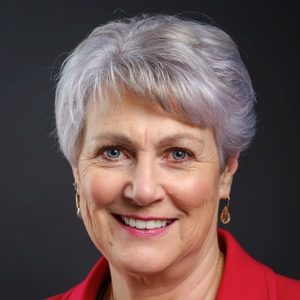
Impacts over generations
“This work is going to be based on our history, our tradition, and our culture so that our children aren’t going off the reserve and they can stay with family.”
The story that
numbers tell:
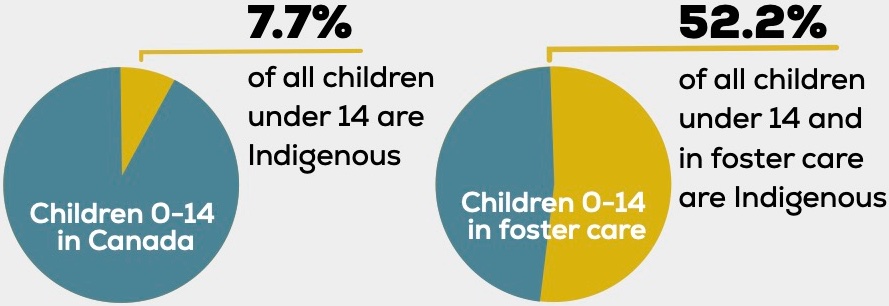
Indigenous children
in foster care
In Canada, 52.2% of children in foster care are Indigenous, but account for only 7.7% of the child population, according to the 2016 Census.
This means 14,970 out of the 28,665 foster children in private homes under the age of 15 are Indigenous.
The Context
The over-representation of Indigenous children and youth in Canada’s child welfare system has been well documented. At the national level, Indigenous children made up just 7.7% of all children under 14 in Canada. Yet they accounted for a staggering 52% of all the children in foster care. (Source: 2016 Stats Canada).
The harm and injustices afflicted on Indigenous children and their families by the current system was well documented by The Truth and Reconciliation Commission of Canada’s work (Commission) leading to louder calls for transformative action to correct the injustices inflected on indigenous families and communities.
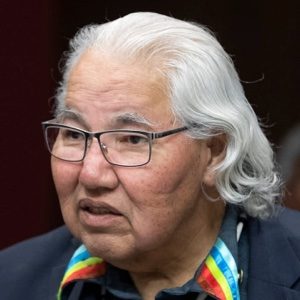
A closer look at provincial numbers paints an equally startling picture on the over-representation of Indigenous children and families in the current care system:
- According to BC’s Ministry of Children and Family Development, less than 10% of the child population in the province is Indigenous. And yet, as of May 2016, 60.1% (4,445) of the total (7,246) children and youth in care in BC were Indigenous.(Source)
- Indigenous children and youth in BC are more than 15 times more likely to be taken into care compared to non-Indigenous children and youth. (Source)
- In May 2016 of the 3,858 children and youth in care in BC who were permanent wards, 2,609 (68%) were Indigenous. (Source)
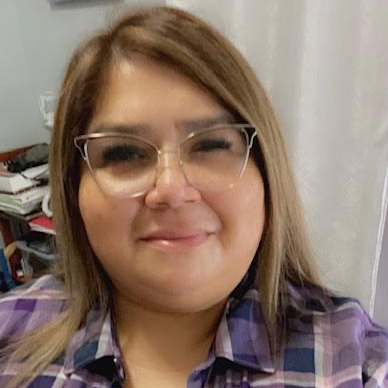
“Snuw’uy’ulhtst tu Quw’utsun Mustimuhw u’ tu Shhw’a’luqwa’a’ i’ Smun’eem” (Laws of the Cowichan People for Families and Children)
On November 24, 2023, the Cowichan Tribes achieved a significant milestone by passing the “Snuw’uy’ulhtst tu Quw’utsun Mustimuhw u’ tu Shhw’a’luqwa’a’ i’ Smun’eem” (Laws of the Cowichan People for Families and Children), marking a pivotal moment in our journey toward self-governance.
This historic decision follows 156 years of colonial laws and is aimed at rectifying longstanding injustices and trauma experienced by Indigenous families.
Our Law and principles are rooted in our Snuw’uy’ulh (teachings). Our ultimate goal is to strengthen families and to put an end to the practice of removing children from the Cowichan community. Cowichan families deserve the necessary support to remain united and have the right to guide decisions that impact them directly.
Laying the Groundwork for a Cowichan Law
Early work by Cowichan Tribe on child protection services began in 1976 when the community saw its first dedicated social worker focused on child welfare. In 1999, Cowichan Tribes Chief and Council passed a resolution expressing the community’s desire to lead its own child and family wellness services and affirming its inherent right to do so. Shortly afterwards, we began working in earnest, laying the groundwork for the day when we could write our own law focusing on prevention, protection and culture.
The following timeline highlights our Nation’s journey towards self-governance in the areas of child and family services.
-
1976
First Cowichan Tribes social worker dedicated to child welfare.
-
1980s
Discussions with Federal Government begin to transition child welfare responsibility to Cowichan Tribes.
-
1991
Cowichan Chief and Council pass a resolution affirming our community’s desire to lead our own child and family wellness services. Extensive work begins shortly afterwards to lay the groundwork for creating our own child welfare law, which will focus on protection, prevention and culture.
-
1993
Cowichan Tribes and BC sign agreement to begin transfer of child welfare services. Khowutzun Child and Family Services (now Lalum’utul’ Smun’eem) opens its doors.
-
1995
Cowichan Tribes assumes responsibility for foster homes and for provision of guardian services.
-
1996
Cowichan Tribes assumes full delegated authority over child and family wellness.
-
2006
Cowichan community wants adoption work to shift and begin following Cowichan protocols and traditions.
-
2008
After several community consultations and policy changes, Lalum’utul Smun’eem Child & Family Services holds its first adoption ceremony in accordance with Cowichan protocols and traditions.
-
2010
A proposal submitted by Lalum’utul Smun’eem Child & Family Services was accepted by the BC Government. Work begins to develop Cowichan legislation for child and family services.
-
2012
Extensive community engagement sessions held with approximately 1500 band members
-
2016
The Cowichan Family Law Justice Project was created as an interim measure to work towards improving Cowichan families’ experiences with the family law justice system and ensure that Cowichan laws and legal processes are part of that experience.
-
2018
Cowichan Tribes begins providing prevention services for the community. Cowichan Tribes Child and Family Justice Pilot Project funded by Law Foundation of BC.
-
Jan 2019
A letter of understanding is signed between the Federal Government, BC and Cowichan Tribes on their commitment to Cowichan Tribes Nation exercising its jurisdiction over child and family wellness.
-
-
Jan 2020
Bill C-92: An Act respecting First Nations, Inuit and Métis children, youth and families receives Royal Assent
-
Feb 2020
Engagement with community members including Elders, judges, province, lawyers from parents legal centre on C-92.
-
Oct 2020
Cowichan Tribes Chief and Council formally give notice to the federal government of our intent to exercise jurisdiction over children and family services and develop our own law.
-
2021
Chief and Council established a dedicated team for the Cowichan Tribes Child and Family Wellness Project and five sub-committees with membership consisting of Elder, community, youth and technical experts. Sub-committees and community working groups continue to meet regularly to advance this work.
-
2021 - 2024
Tri-partite negotiation table focuses on developing coordination agreement, law and service delivery model
-
2021 - 2023
The Child and Family Wellness Project Team conducts 20+ community engagement sessions, featuring two off-reserve events and live-streamed sessions, sharing information about our Law and gathering input from citizens.
-
Spring 2024
Sign coordination agreement to reclaim jurisdiction or defer if more time is needed.
-
2024 - 2026
Signing of coordination agreement and transfer of jurisdiction; staged implementation of our Law.
“We had our own laws in the past where our Elders looked after our children, and the whole community looked after our children. It takes a community to raise a child.”
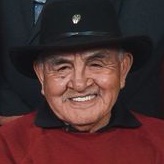
“This agreement with the Cowichan Tribes and the federal government is a major step forward as we work hand in hand to keep families together in the best interest of children and youth. Indigenous children, like all children, deserve to grow up in safe, loving homes, connected to their community and culture. We are committed to working collaboratively and respectfully with Indigenous communities to make a positive difference for families.”
